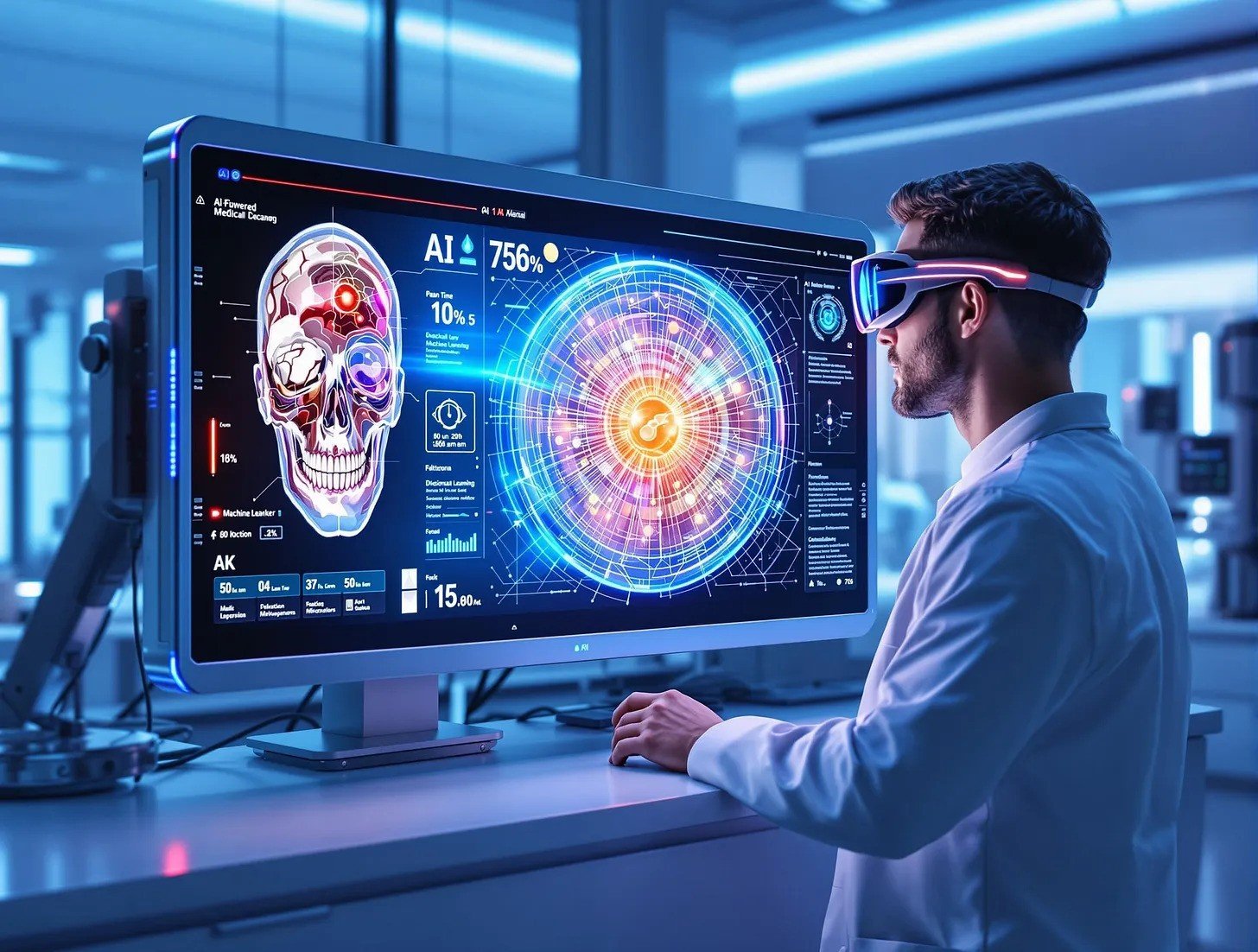A recent study conducted at the Skin Tumor Center of the University Hospital Münster (UKM) in Germany has revealed the potential of artificial intelligence (AI) to transform skin cancer treatment decisions. However, it also highlighted major challenges related to data quality and availability.
The study, led by a multidisciplinary team of dermatologists, medical informatics experts, and AI researchers, aimed to evaluate the readiness of clinical data for building an AI-powered Clinical Decision Support System (CDSS) for malignant melanoma, the most serious form of skin cancer.
Key Findings:
- 41 critical data points were identified as necessary for informed treatment decisions.
- Only about one-third of these were available in a structured, machine-readable format.
- Many crucial factors—like patient lifestyle, travel ability, or reproductive plans—were not captured systematically.
“We’re at a critical juncture in oncology,” said Dr. Stephan A. Braun, lead author. “AI can help process the growing complexity of patient data, but it demands high-quality, structured input.”
The research team gathered data from multiple sources, including:
- Electronic medical records
- Laboratory test results
- Cancer registry entries
Dr. Tobias Brix, a medical informatics expert, noted that much of the important information was buried in unstructured text—doctors’ notes and reports—which current AI systems struggle to process.
Potential Applications of AI in Skin Cancer Treatment:
- Managing tumor progression during/after adjuvant therapy
- Deciding when to stop or change treatments
- Handling severe side effects
- Choosing the most effective treatment sequence
- Reinitiating treatment after complications
- Monitoring treatment response
- Identifying patients for clinical trials
- Enhancing follow-up care
Dr. Carsten Weishaupt emphasized: “In complex decision-making, AI tools analyzing similar past cases can be incredibly helpful.”
Recommendations for Hospitals:
- Standardize clinical documentation
- Use structured data fields (dropdowns, checkboxes) instead of free text
- Invest in Natural Language Processing (NLP) to unlock existing data
- Expand data collection to include patient social and lifestyle factors
- Improve interoperability between hospital IT systems
“These changes won’t be easy,” said Dr. Ralph Bergmann, “but the long-term benefits for patient care and hospital efficiency are massive.”
The study also addresses data privacy concerns, as more patient data is centralized. Dr. Joscha Grüger, an AI ethics researcher, called for open dialogue between clinicians, patients, and policymakers.
Looking Forward
The team plans to:
- Involve a larger and more diverse group of doctors
- Refine the list of relevant data points
- Develop standards for clinical documentation
“This is just the beginning,” said Dr. Braun. “Real transformation will require collaboration between clinicians, data scientists, and AI experts.”
Dr. Michael Storck, an external informatics expert, praised the study for moving beyond hype to address the real, practical steps needed for AI integration in medicine.
Conclusion
AI holds tremendous promise to revolutionize oncology. But success depends on high-quality data and well-designed systems.
“The future of cancer care will be data-driven.”
— Dr. Stephan A. Braun
জার্মানির ইউনিভার্সিটি হসপিটাল মুনস্টার (UKM)-এর স্কিন টিউমার সেন্টারে পরিচালিত একটি সাম্প্রতিক গবেষণায় দেখা গেছে, চর্ম ক্যানসার চিকিৎসা সিদ্ধান্তে কৃত্রিম বুদ্ধিমত্তা (AI) বিপ্লব ঘটাতে পারে। তবে, এই গবেষণায় ডেটার গুণমান ও প্রাপ্যতা নিয়ে বড় চ্যালেঞ্জগুলোর কথাও উঠে এসেছে।
চর্মরোগ বিশেষজ্ঞ, মেডিকেল ইনফরমেটিক্স এবং AI গবেষকদের নিয়ে গঠিত একটি বহুবিধ বিশেষজ্ঞ দল এই গবেষণার নেতৃত্ব দেন। তাদের লক্ষ্য ছিল: ম্যালিগন্যান্ট মেলানোমা (সবচেয়ে মারাত্মক চর্ম ক্যানসার) চিকিৎসার জন্য AI-ভিত্তিক ক্লিনিকাল ডিসিশন সাপোর্ট সিস্টেম (CDSS) তৈরির জন্য বিদ্যমান ডেটা কতটা প্রস্তুত।
প্রধান আবিষ্কারসমূহ:
- ৪১টি গুরুত্বপূর্ণ তথ্যসূত্র চিকিৎসা সিদ্ধান্তের জন্য চিহ্নিত হয়।
- এর মধ্যে মাত্র এক-তৃতীয়াংশ গঠনগত (structured) ও সহজে প্রাপ্তিযোগ্য ছিল।
- রোগীর জীবনধারা, ভ্রমণ ক্ষমতা বা সন্তান নেওয়ার ইচ্ছা—এই ধরণের তথ্যগুলো সিস্টেমে সুনির্দিষ্টভাবে সংরক্ষিত ছিল না।
“আমরা অনকোলজিতে একটি গুরুত্বপূর্ণ সন্ধিক্ষণে দাঁড়িয়ে আছি,” বলেন ড. স্টিফান এ. ব্রাউন। “AI রোগীর জটিল তথ্য বিশ্লেষণে সহায়তা করতে পারে, কিন্তু এর জন্য প্রয়োজন উচ্চ-মানের, গঠনতান্ত্রিক তথ্য।”
তারা যেসব উৎস থেকে তথ্য সংগ্রহ করেছেন:
- ইলেকট্রনিক মেডিকেল রেকর্ড
- ল্যাব পরীক্ষার ফলাফল
- ক্যানসার রেজিস্ট্রির তথ্য
ড. টোবিয়াস ব্রিক্স বলেন, গুরুত্বপূর্ণ অনেক তথ্য অগঠিত লেখার মধ্যে লুকানো ছিল—যেমন চিকিৎসকের নোট বা রিপোর্ট—যা AI-এর জন্য বিশ্লেষণ করা কঠিন।
চর্ম ক্যানসার চিকিৎসায় AI-এর সম্ভাব্য ব্যবহার:
- এডজুভেন্ট থেরাপির সময় বা পরে টিউমারের অগ্রগতি পর্যবেক্ষণ
- কবে চিকিৎসা পরিবর্তন বা বন্ধ করতে হবে তা নির্ধারণ
- গুরুতর পার্শ্বপ্রতিক্রিয়া ব্যবস্থাপনা
- চিকিৎসার সঠিক ক্রম নির্ধারণ
- পার্শ্বপ্রতিক্রিয়ার পর চিকিৎসা পুনরায় শুরু করা
- চিকিৎসার ফলাফল পর্যবেক্ষণ
- ক্লিনিকাল ট্রায়ালের জন্য রোগী নির্বাচন
- ফলোআপ চিকিৎসা উন্নত করা
ড. কার্সটেন ওয়েইশাউপ্ত বলেন, “জটিল চিকিৎসা সিদ্ধান্তে, পূর্বের অনুরূপ কেস বিশ্লেষণ করে AI চিকিৎসকদের গুরুত্বপূর্ণ অন্তর্দৃষ্টি দিতে পারে।”
হাসপাতালের জন্য সুপারিশসমূহ:
১. ডকুমেন্টেশন মানকীকরণ করুন
২. গঠনতান্ত্রিক ডেটা এন্ট্রির (ড্রপডাউন, চেকবক্স ইত্যাদি) উপর জোর দিন
৩. NLP প্রযুক্তিতে বিনিয়োগ করুন, যাতে বিদ্যমান লেখ্য তথ্য বিশ্লেষণ করা যায়
৪. রোগীর সামাজিক ও ব্যক্তিগত তথ্যও নিয়মিতভাবে সংগ্রহ করুন
৫. হাসপাতালগুলোর মধ্যে তথ্য বিনিময় সক্ষমতা বাড়ান
“এই পরিবর্তনগুলো সহজ হবে না,” বলেন ড. রাল্ফ বার্গম্যান। “তবে রোগীসেবা এবং স্বাস্থ্যসেবার দক্ষতা বাড়াতে এর ফলাফল হবে বিশাল।”
এই গবেষণায় ডেটা গোপনীয়তা বিষয়েও গুরুত্ব দেওয়া হয়েছে। ড. জোশা গ্রুগার, AI নৈতিকতা গবেষক, বলেন, “রোগী, চিকিৎসক ও নীতিনির্ধারকদের মধ্যে এই বিষয়ে খোলামেলা আলোচনার প্রয়োজন।”
ভবিষ্যতের পরিকল্পনা:
গবেষণা দল:
- আরও বেশি এবং বৈচিত্র্যময় চিকিৎসককে যুক্ত করতে চায়
- গুরুত্বপূর্ণ তথ্যের তালিকা পর্যালোচনা ও উন্নত করতে চায়
- মানসম্মত ডকুমেন্টেশন পদ্ধতি তৈরি ও পরীক্ষার পরিকল্পনা করছে
“এই গবেষণা কেবল শুরু,” বলেন ড. ব্রাউন। “বাস্তব পরিবর্তন আনতে চিকিৎসক, তথ্য বিজ্ঞানী ও AI বিশেষজ্ঞদের সমন্বিত প্রচেষ্টা দরকার।”
ড. মাইকেল স্টর্ক, যিনি গবেষণায় সরাসরি জড়িত ছিলেন না, বলেন, “এই গবেষণা AI নিয়ে অতিরিক্ত আশাবাদের বাইরে গিয়ে বাস্তব সমস্যাগুলো চিহ্নিত করেছে—যা খুবই গুরুত্বপূর্ণ।”
উপসংহার
AI অনকোলজি চিকিৎসায় বিপ্লব ঘটানোর ব্যাপক সম্ভাবনা রাখে। তবে, সেই সফলতা নির্ভর করবে মানসম্মত ডেটা ও দক্ষ সিস্টেম তৈরির উপর।
“ভবিষ্যতের ক্যানসার চিকিৎসা হবে ডেটা-নির্ভর।”
— ড. স্টিফান এ. ব্রাউন




